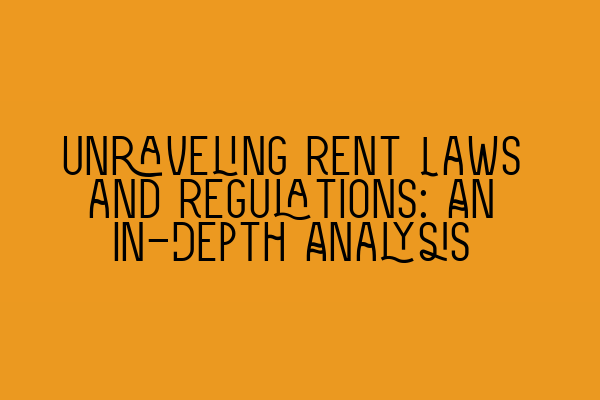Unraveling Rent Laws and Regulations: An In-Depth Analysis
As a solicitor specializing in property law and land law at SQE Property Law & Land Law, I understand the complex nature of rent laws and regulations. Whether you’re a landlord or a tenant, it’s crucial to have a thorough understanding of the legal framework that governs rental agreements. In this blog post, I will dive deep into the intricacies of rent laws and regulations, providing you with valuable insights and actionable advice.
The Basics of Rent Laws
Before we delve into the complexities, it’s essential to grasp the fundamental principles of rent laws. Rent laws are designed to establish a fair and balanced relationship between landlords and tenants, ensuring that both parties are protected. These laws outline the rights and responsibilities of both landlords and tenants, as well as the processes and procedures that must be followed throughout the tenancy.
One of the key aspects of rent laws is rent control, which regulates the amount landlords can charge for rent. Rent control laws vary from jurisdiction to jurisdiction, and it’s crucial for both landlords and tenants to be aware of the specific regulations in their area. Understanding rent control laws is essential for landlords to avoid legal troubles and for tenants to ensure they are not being charged unfairly.
Types of Rental Agreements
When it comes to rental agreements, there are various types that landlords and tenants may enter into. The most common types include:
- Assured Shorthold Tenancies (ASTs): ASTs are the most common type of tenancy agreement in the UK. They provide tenants with a minimum assured period of occupancy, typically six months or longer. ASTs offer certain legal protections to both landlords and tenants.
- Assured Tenancies: Assured tenancies provide tenants with more long-term security of tenure. Unlike ASTs, assured tenancies do not have a minimum assured period, and tenants have the right to remain in the property for an extended period.
- Regulated Tenancies: Regulated tenancies are a form of tenancy agreement that existed before the introduction of ASTs. They offer tenants significant rights and protections, including the right to remain in the property for life.
Understanding the type of rental agreement you have is crucial, as each type comes with its own set of rights and responsibilities. It’s recommended to consult with a legal professional to ensure you are aware of your rights and obligations under the specific type of rental agreement you have.
Important Considerations for Landlords
For landlords, there are several key considerations when it comes to rent laws and regulations. Some of the most important ones include:
- Compliance with Rent Control Laws: Landlords must ensure they are not charging rent above the allowable limit set by rent control laws in their jurisdiction. Failure to comply with these regulations can result in legal consequences.
- Eviction Procedures: If a landlord needs to evict a tenant, they must follow the proper legal procedures outlined by the local laws. Evicting a tenant without adhering to these procedures can lead to significant legal issues for landlords.
- Tenant Screening and Reference Checks: To mitigate the risks associated with problematic tenants, landlords should conduct thorough tenant screening and reference checks. This helps ensure that tenants are reliable and financially capable of paying their rent.
By understanding and adhering to these important considerations, landlords can effectively navigate the complexities of rent laws and regulations and protect their best interests.
Key Rights for Tenants
Tenants also have essential rights under rent laws and regulations. Familiarizing yourself with these rights is vital for protecting yourself as a tenant. Some important tenant rights include:
- The Right to Live in a Habitable Property: Landlords have an obligation to provide tenants with a property that is safe, clean, and in good repair. If a landlord fails to maintain the property adequately, tenants have the right to request repairs or take legal action.
- Protection Against Unfair Rent Increases: Rent control laws protect tenants from arbitrary and excessive rent increases. Tenants have the right to challenge rent increases that are above the limit specified by the relevant rent control regulations.
- Protection Against Retaliatory Evictions: If tenants exercise their legal rights, such as reporting maintenance issues or organizing tenant unions, landlords cannot retaliate by evicting them. Retaliatory evictions are illegal.
Knowing your rights as a tenant empowers you to assert your entitlements and ensures you are not taken advantage of by unscrupulous landlords.
Staying Informed and Seeking Legal Advice
Given the complexity of rent laws and regulations, it’s crucial to stay informed and up-to-date with any changes or updates in your jurisdiction. Legal advice from a qualified property law solicitor can also be invaluable in understanding and navigating the intricacies of rent laws.
At SQE Property Law & Land Law, we offer comprehensive SQE 1 and SQE 2 preparation courses, ensuring that aspiring solicitors are equipped with the knowledge and skills necessary to excel in property law. Additionally, our practice exam questions and practice mocks for SQE 1 provide valuable opportunities for students to assess their understanding and boost their confidence before taking the exams.
Stay tuned to our blog for more informative articles on property law, SQE exam preparation, and important updates on SRA SQE exam dates. Together, we can unravel the complexities of rent laws and regulations, ensuring a fair and harmonious relationship between landlords and tenants.
Related Articles:
